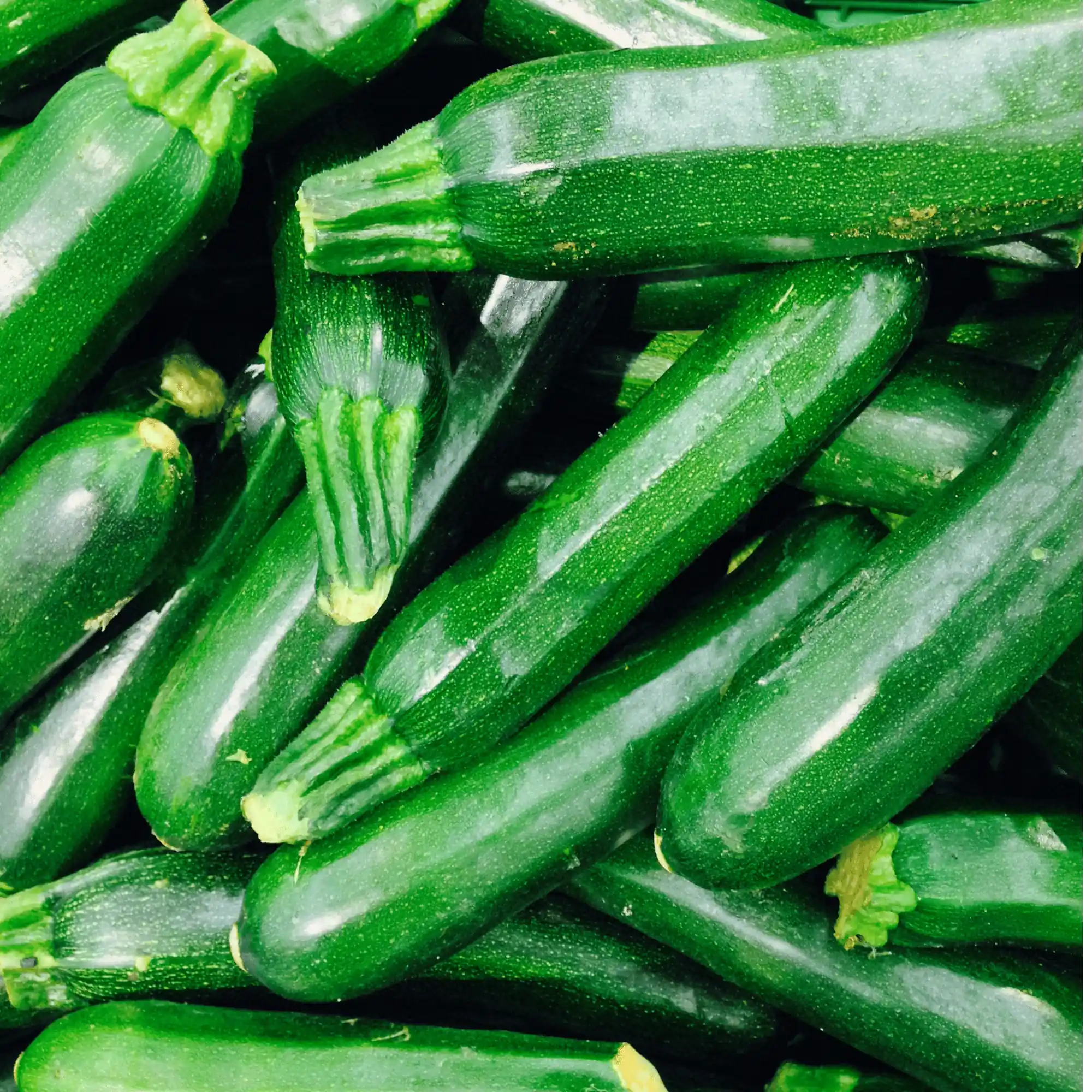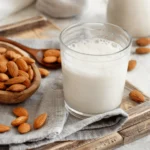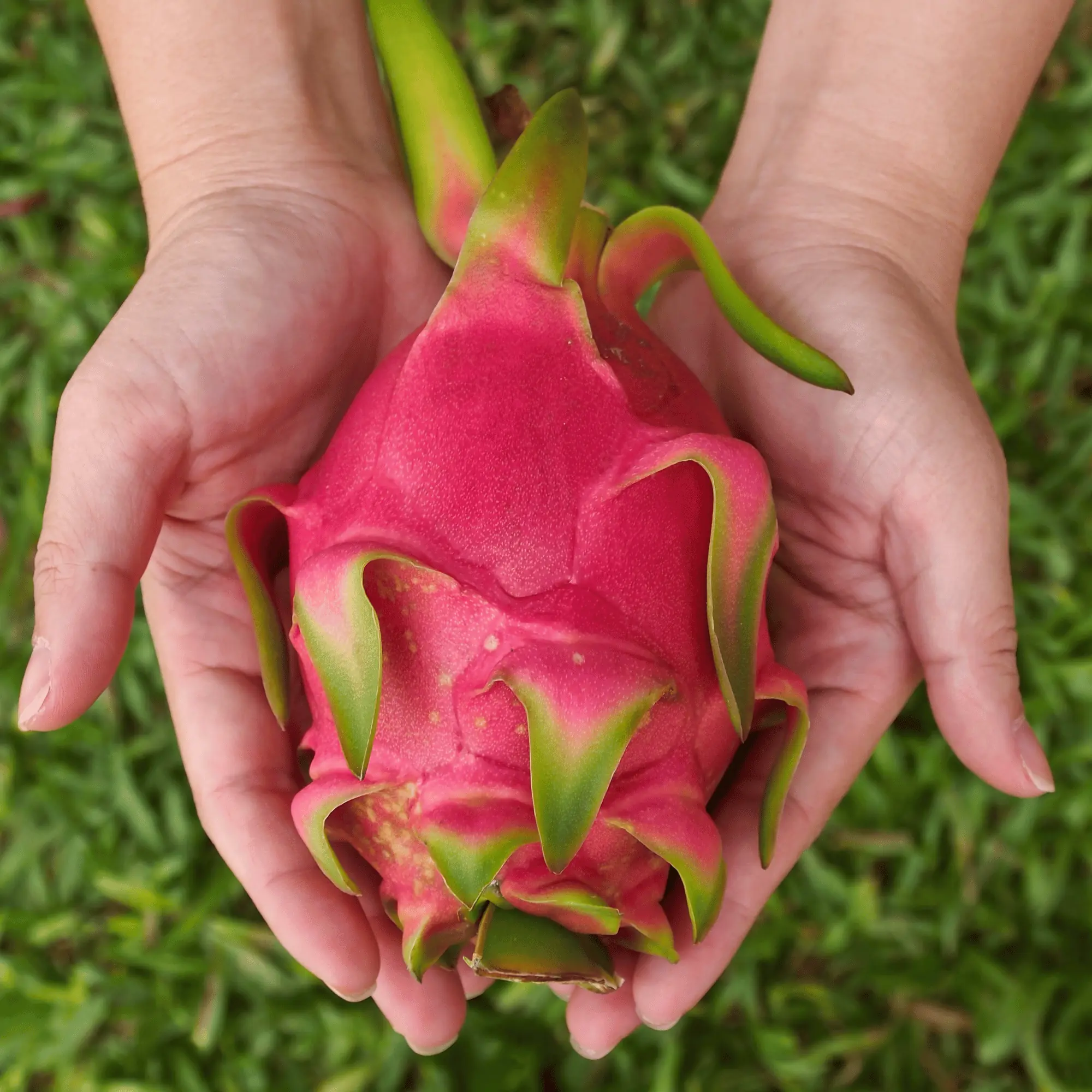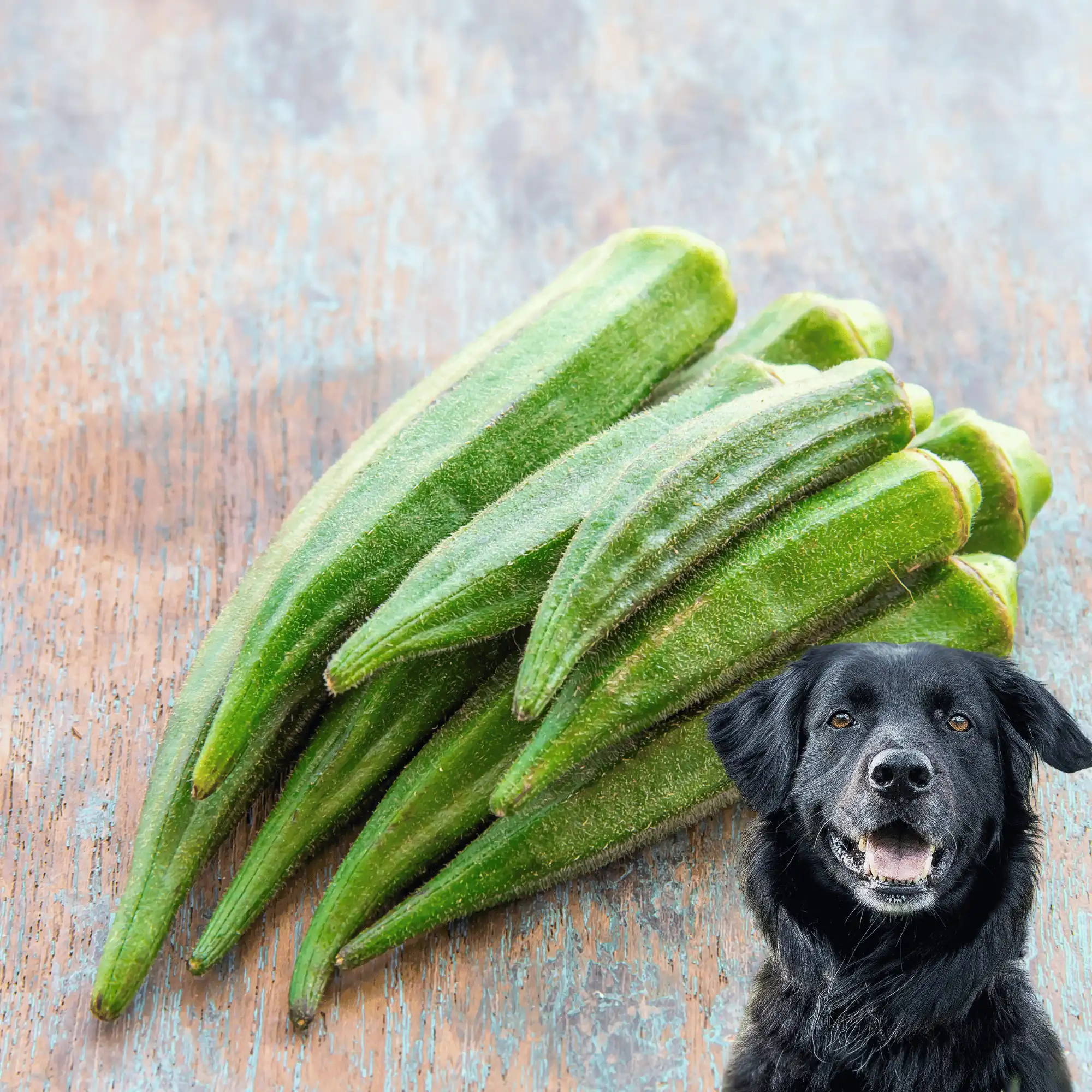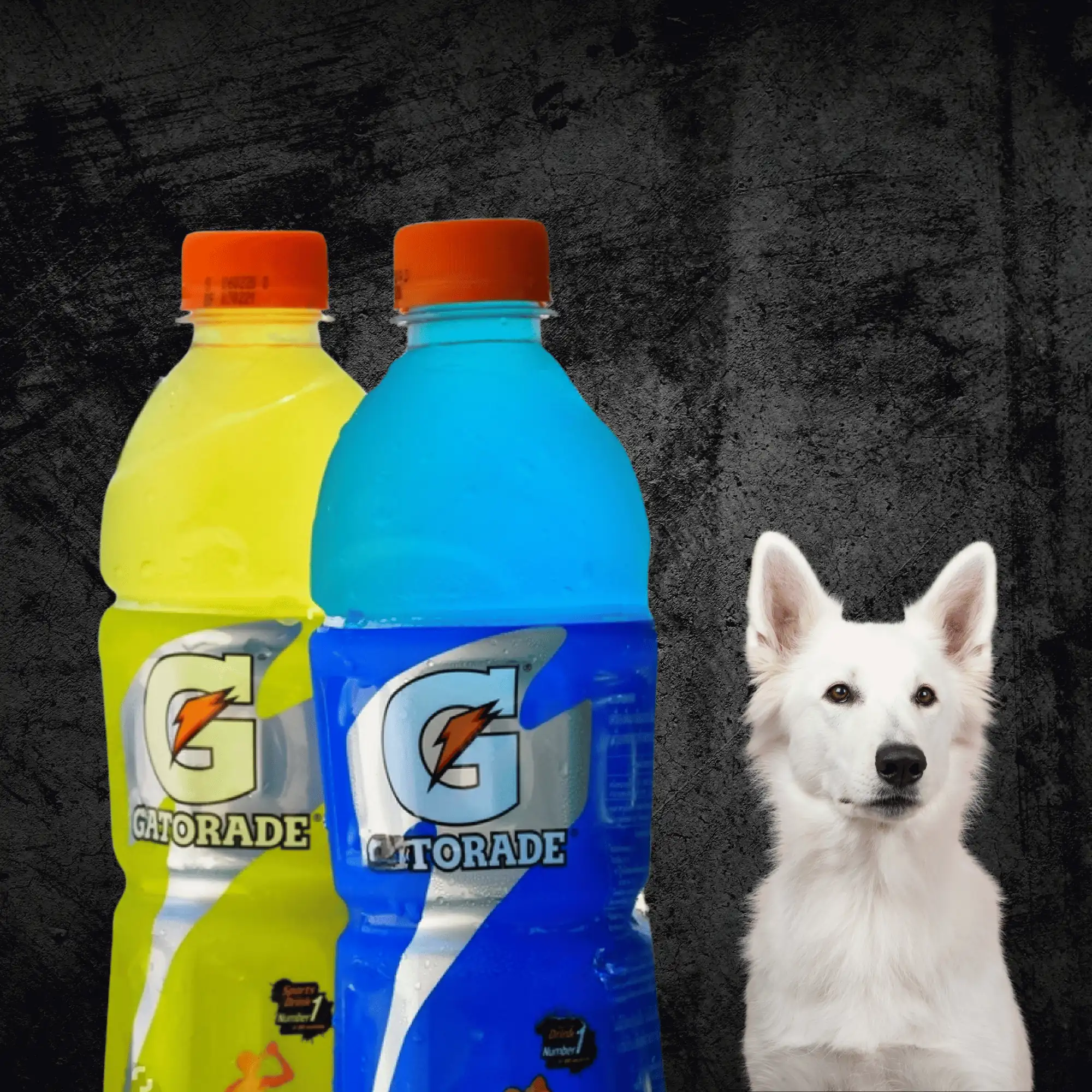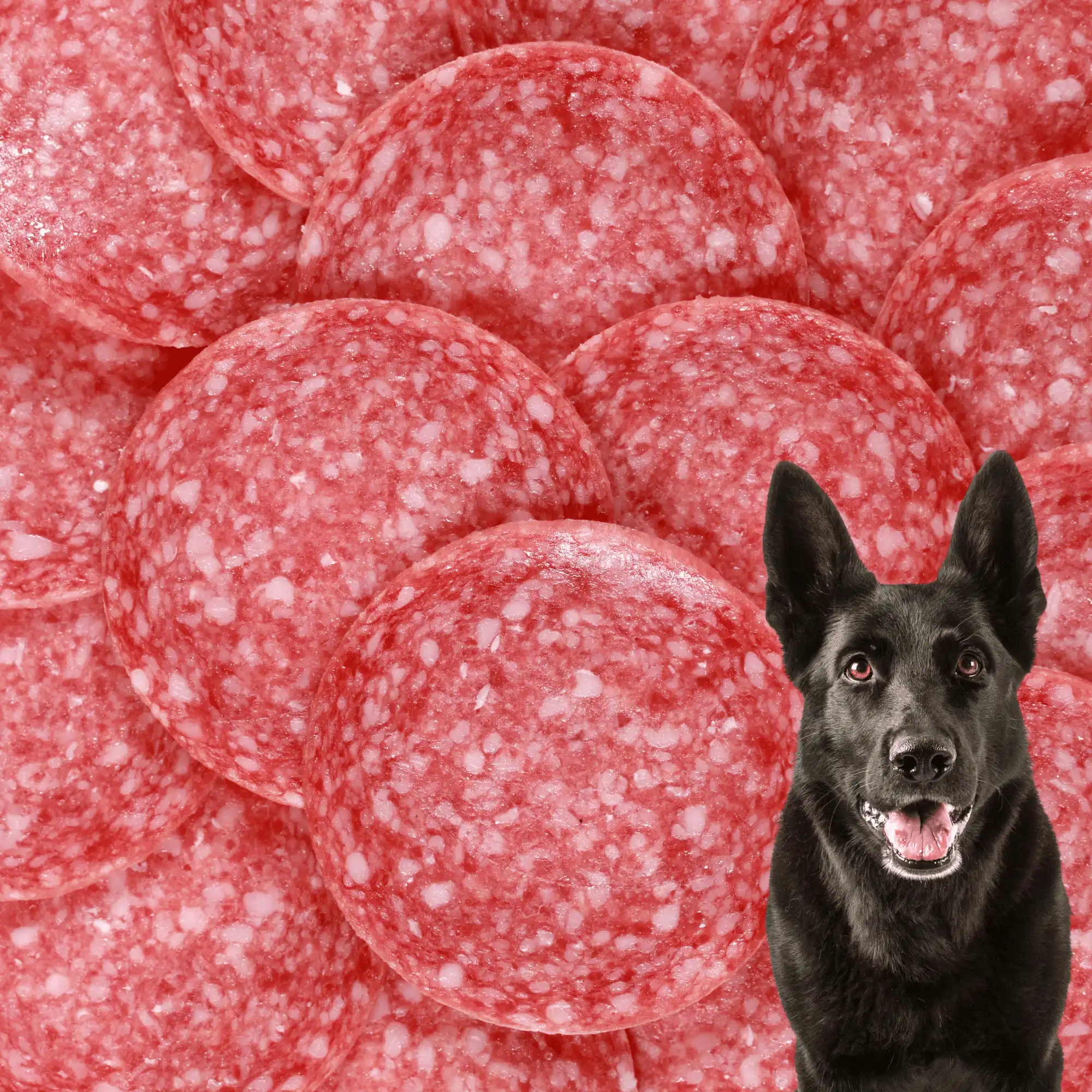As pet owners, we often want to share our favorite foods with our beloved canine companions. Courgettes, also known as zucchinis, are a popular vegetable many enjoy. They’re nutritious, versatile, and low in calories, making them a tempting option to include in our dog’s diet. However, before offering courgettes to our furry friends, it’s essential to explore whether they’re safe and beneficial for dogs to consume.
In this article, we’ll delve into the truth about feeding courgettes to dogs, examining their nutritional benefits, potential risks, and the best practices for incorporating them into your dog’s diet.
In this blog post, we’ll be exploring:
- Can Dogs Eat Courgette?
- Are All Parts of the Courgette Plant Safe for Dogs to Eat?
- Nutritional Benefits of Courgette for Dogs
- Potential Risks of Courgette for Dogs
- How to Safely Introduce Zucchini to Your Dog?
- What’s the Safe Amount of Zucchini for Dogs to Eat?
- What Other Vegetables Are Good for Dogs to Eat?
Can Dogs Eat Courgette?
Yes, courgette can be a healthy addition to your dog’s diet. Courgettes, also known as Zucchini, belong to the squash family, and while technically a fruit, we usually treat them as veggies. They’re low in calories, rich in fiber, and loaded with vitamins A, C, and B9, potassium, calcium, beta-carotene, and folate. Because they’re so light on calories but high in fiber, they’re a fantastic option for pups watching their waistlines. So, feel free to treat your furry friend to some courgette goodness!
However, like with any new food, it’s crucial to introduce courgette to your dog’s diet gradually and in moderation. If your dog consumes too much courgette at once, it could lead to digestive issues such as gas or an upset stomach. So, while courgette can be a nutritious treat for your furry friend, it’s best to enjoy it in moderation to avoid any discomfort.
Are All Parts of the Courgette Plant Safe for Dogs to Eat?
There’s no need to worry if your dog snags a courgette flower or munches on some leaves – they’re completely safe and non-toxic. People often cook and enjoy them too!
But if your furry friend has a habit of exploring the garden buffet-style, it’s a good idea to keep an eye out for any other plants that could be harmful if ingested. Prevention is always better than cure when it comes to our pets’ well-being.
Nutritional Benefits of Courgette for Dogs:
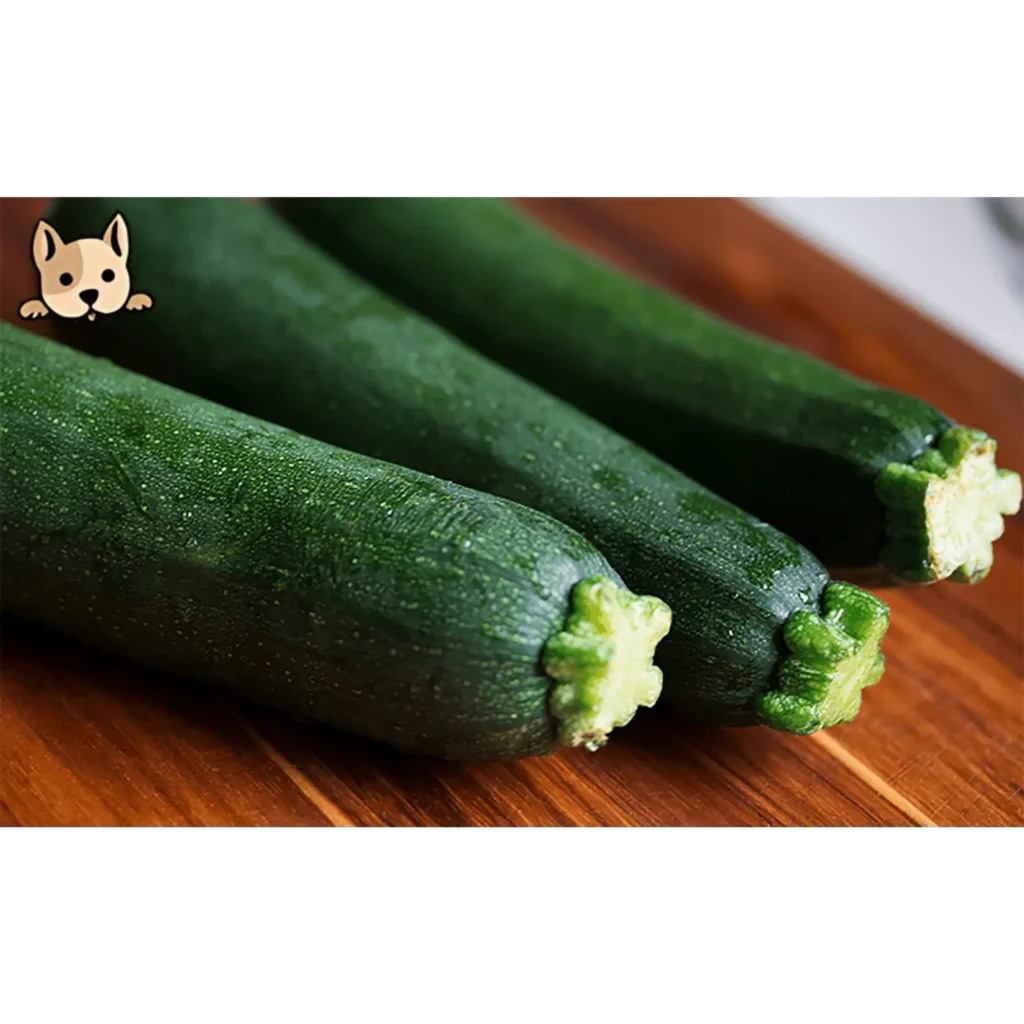
Courgettes can offer several nutritional benefits for dogs when incorporated into their diet in moderation. Here are some of the nutritional pros of courgettes for dogs:
1. Low in Calories:
One of the significant benefits of courgettes for dogs is that they are low in calories. This attribute makes them an excellent option for dogs who need to manage their weight or maintain a healthy weight. By incorporating courgettes into their diet, pet owners can provide a satisfying snack or meal addition without significantly increasing their dog’s calorie intake.
This feature is particularly advantageous for dogs on weight management programs or those prone to weight gain, as it allows them to enjoy treats without compromising their calorie goals.
2. High in Fiber:
Another notable benefit of courgettes for dogs is their high fiber content. Fiber plays a crucial role in digestive health by promoting regular bowel movements and aiding in the prevention of constipation and diarrhea.
By incorporating courgettes into their diet, dogs can benefit from the added fiber, which supports healthy digestion and contributes to overall gastrointestinal function. Additionally, fiber helps promote a feeling of fullness, which can be beneficial for dogs who may need to manage their weight or feel satisfied between meals.
3. Vitamins and Minerals:
Courgettes contain vitamin C, which is essential for immune function. This vitamin helps support the body’s natural defenses against infections and diseases, promoting overall health and well-being in dogs.
Vitamin K is important for blood clotting and bone health. Courgettes provide a source of vitamin K, which contributes to the maintenance of healthy bones and proper blood clotting function in dogs.
Potassium is an electrolyte that plays a vital role in maintaining proper muscle and nerve function, as well as regulating fluid balance in the body. Courgettes are a good source of potassium, helping to support cardiovascular health and muscle function in dogs.
4. Antioxidants:
Courgettes contain beta-carotene, a type of carotenoid antioxidant that gives certain fruits and vegetables their vibrant orange color. In the body, beta-carotene is converted into vitamin A, which plays a crucial role in maintaining healthy vision, supporting immune function, and promoting skin health in dogs.
Courgettes also contain lutein and zeaxanthin, two antioxidants that belong to the carotenoid family. These antioxidants are known for their role in promoting eye health by filtering harmful blue light and protecting the retina from oxidative damage. Including courgettes in a dog’s diet can help support their vision and overall eye health.
5. Low in Fat and Sodium:
Courgettes are naturally low in fat, which makes them an excellent option for dogs, especially those needing to manage their weight or those prone to pancreatitis. By incorporating courgettes into their diet, pet owners can provide a nutritious snack or meal addition without significantly increasing their dog’s fat intake.
Courgettes are also low in sodium, which is beneficial for dogs, particularly those with hypertension or kidney issues. A low-sodium diet can help support cardiovascular health and manage blood pressure levels in dogs. By offering courgettes as a part of their diet, pet owners can help maintain their dog’s overall health and well-being.
While courgettes can offer several nutritional benefits for dogs, they should be given in moderation as part of a balanced diet. Too much of any food, including courgettes, can lead to digestive upset or nutritional imbalances.
Potential Risks of Courgette for Dogs:
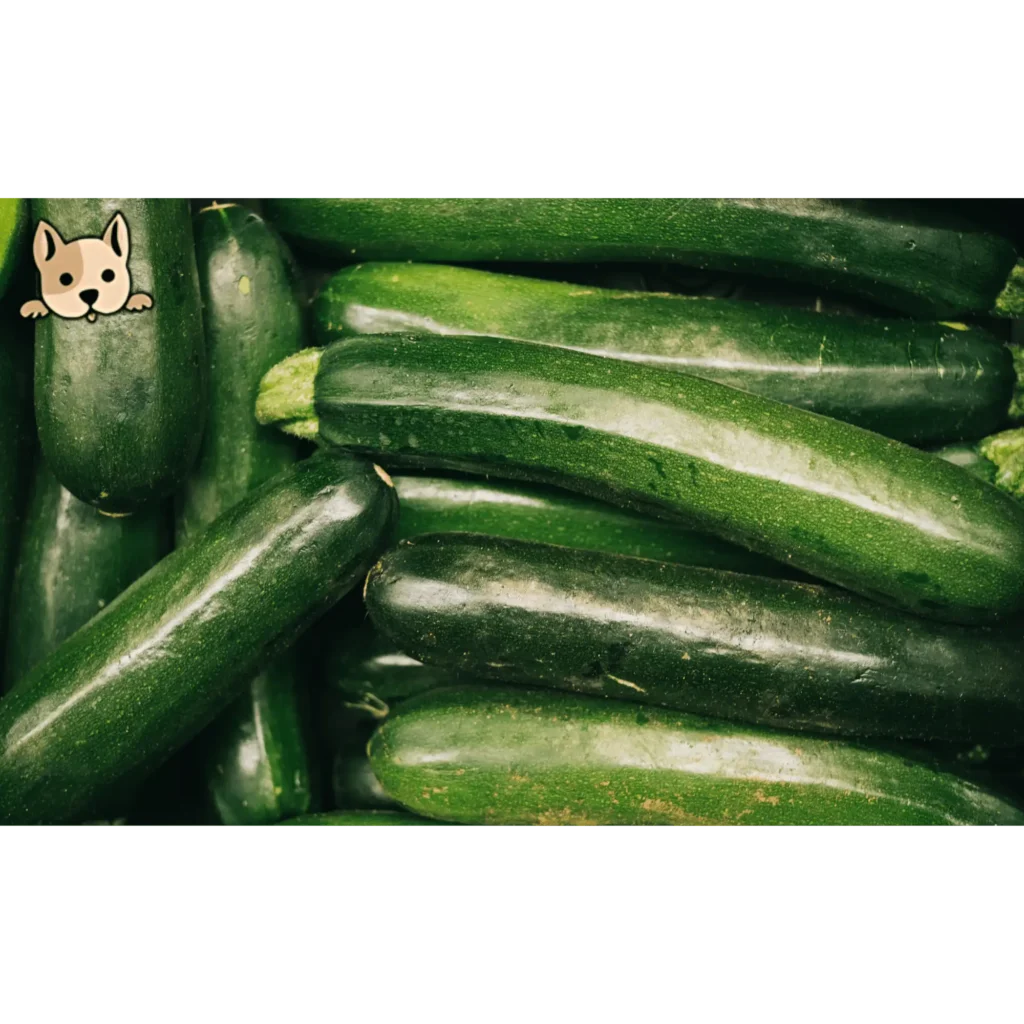
While courgettes can offer various nutritional benefits to dogs, there are also potential risks to consider:
1. Gastrointestinal Upset:
Introducing new foods into a dog’s diet, including courgettes, can sometimes cause digestive upsets such as diarrhea, vomiting, or gas. This can occur if a dog’s digestive system is sensitive to dietary changes or if they consume large amounts of courgettes too quickly.
2. Allergic Reactions:
Although uncommon, some dogs may be allergic to courgettes or develop sensitivities to certain components within them.
Signs of an allergic reaction may include itching, redness, swelling, or gastrointestinal disturbances. If any of these symptoms occur after feeding courgettes, it’s essential to discontinue their use and consult a veterinarian.
3. Pesticide Residues:
Courgettes, like many fruits and vegetables, may contain pesticide residues if not properly washed or if non-organic varieties are used. Ingesting pesticides can potentially lead to toxicity or adverse health effects in dogs.
Therefore, it’s essential to thoroughly wash courgettes before feeding them to dogs, or opt for organic varieties whenever possible.
4. Obstruction Risk:
Although rare, the fibrous nature of courgettes could pose a risk of gastrointestinal obstruction, particularly if a dog ingests large pieces without adequate chewing.
This risk is higher if courgettes are fed in large quantities or if dogs have a tendency to gulp their food without chewing properly.
5. High Oxalate Content:
Courgettes contain oxalates, naturally occurring compounds that can contribute to the formation of kidney stones or urinary tract issues in susceptible dogs.
Dogs with a history of calcium oxalate stones or urinary tract problems may need to limit their intake of high-oxalate foods like courgettes.
To minimize these risks, it’s essential to introduce courgettes gradually into a dog’s diet, monitor for any adverse reactions, and feed them in moderation. Additionally, always wash courgettes thoroughly, consider opting for organic varieties, and cut them into small, manageable pieces to reduce the risk of obstruction.
How to Safely Introduce Zucchini to Your Dog?
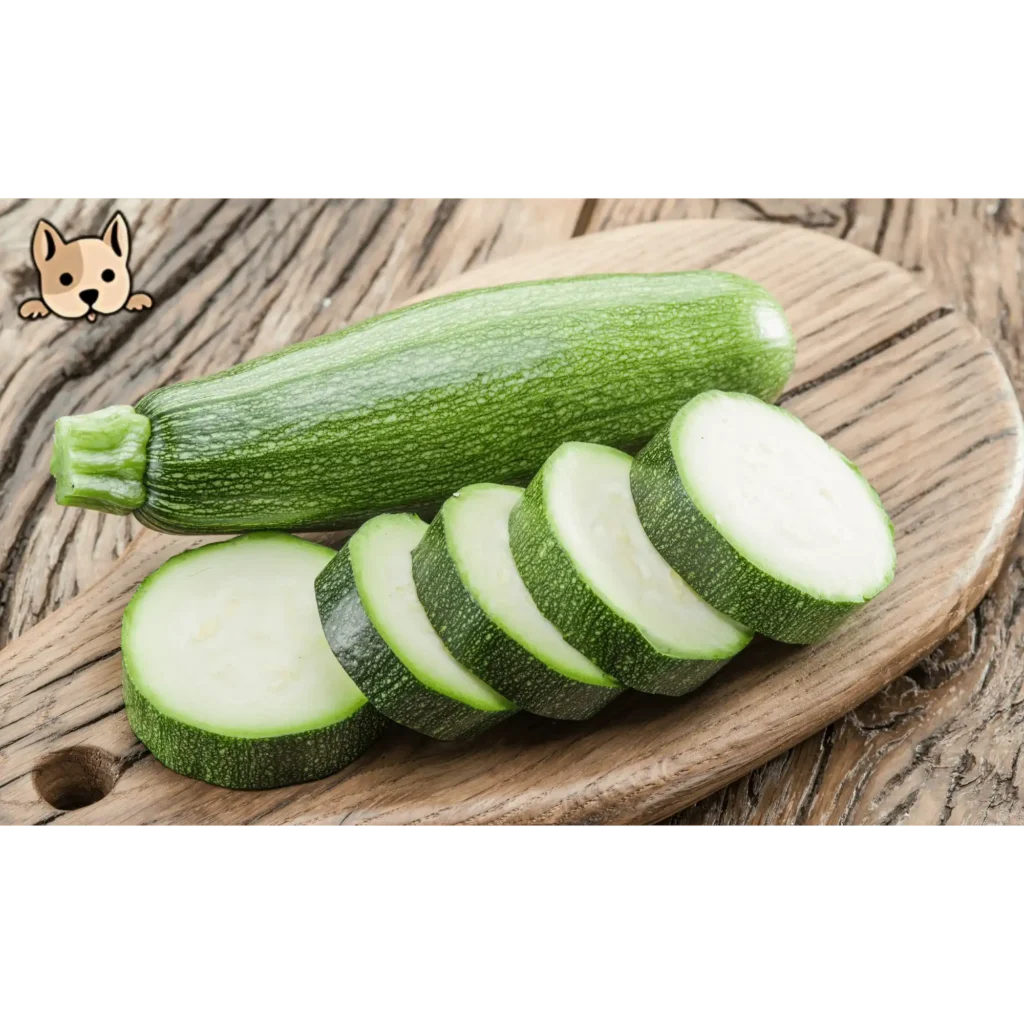
Courgette can be a tasty addition to your dog’s meals, whether it’s grilled, baked, or added to homemade dishes. Just make sure to skip the seasonings like garlic or onion, which aren’t safe for dogs. It’s best to set aside some plain courgette for your pup rather than sharing your seasoned dinner.
You can also get creative with frozen courgette slices as a refreshing treat on hot days, or shred it raw over your dog’s dinner. Remember, start with small quantities and cut them into manageable chunks to prevent choking.
While dogs can safely enjoy courgette in moderation, keep in mind that they might not all be fans of the taste. Let them have a sniff first to see if they’re interested.
And always remember the 10% rule – treats like courgette should make up no more than 10% of your dog’s daily calories, with the rest coming from a balanced diet.
Now that you know dogs can enjoy courgette, why not explore other safe foods for your furry friend? Check out our article on whether dogs can eat cucumber next!
What’s the Safe Amount of Zucchini for Dogs to Eat?
Feeding your dog small amounts of plain zucchini as an occasional treat is perfectly safe. However, introduce it slowly, as the high fiber content may upset their stomach. Observe how your dog reacts to a small serving before offering a full portion.
Here are some general guidelines for the safe consumption of courgette based on your dog’s weight. Remember, these are just rough estimates, and consulting your vet is always wise, especially if your dog has health concerns or sensitivities.
| Dog Size | Courgette Serving Size |
| Extra-small (2–20 lbs) | 1 teaspoon per day |
| Small (21–30 lbs) | 1–2 teaspoons per day |
| Medium (31–50 lbs) | 2–3 teaspoons per day |
| Large (51–90 lbs) | 1–2 tablespoons per day |
| Extra-large (over 90 lbs) | 3–4 tablespoons per day |
What Other Vegetables Are Good for Dogs to Eat?
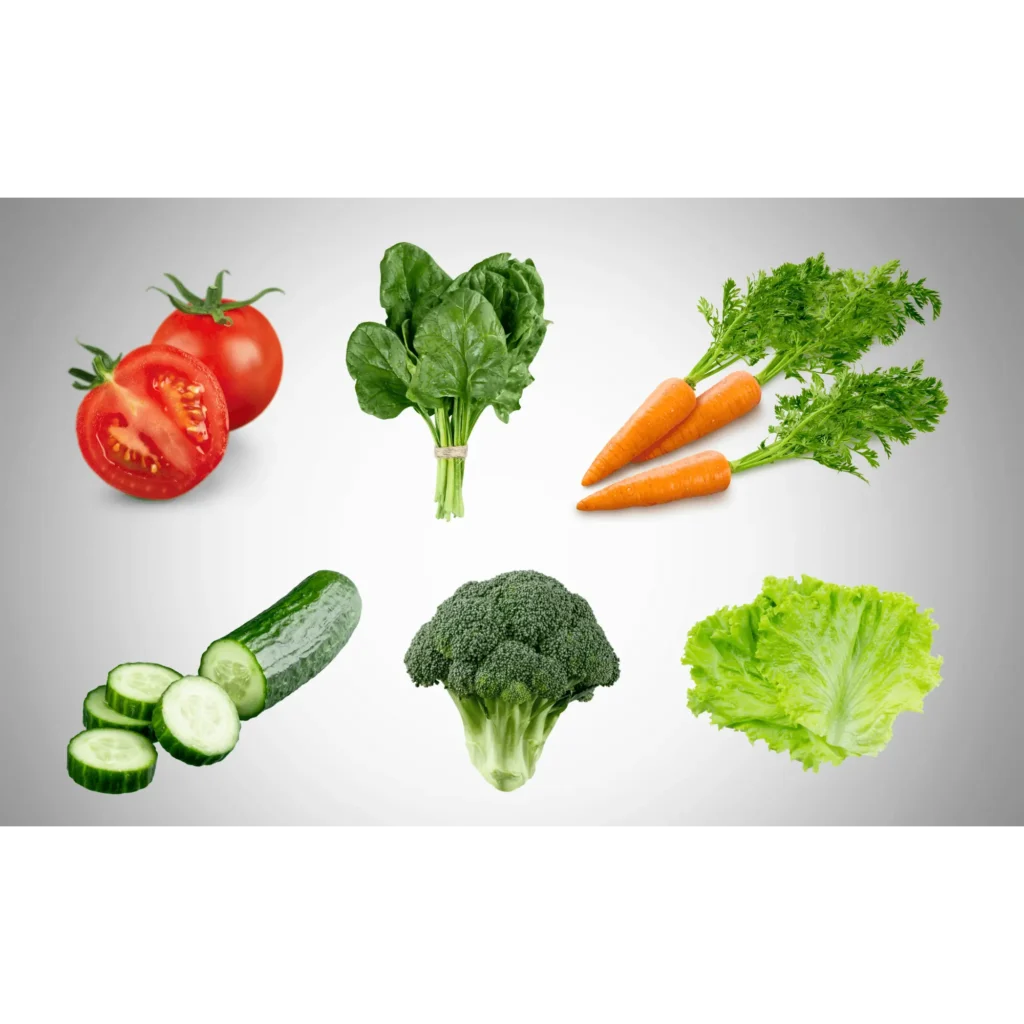
Courgette isn’t the only veggie safe for your furry friend! Here’s a variety of veggies your dog might enjoy:
- Beans
- Broccoli: Rich in Vitamins A, C, and K, and potassium, but it is easy to avoid gas.
- Carrots: Packed with Vitamins A, C, and K, plus potassium.
- Cauliflower: Loaded with Vitamins A, C, and K, potassium, and fiber.
- Celery
- Cucumbers: Hydrating and low-calorie thanks to their high water content.
- Green beans
- Lettuce: Offers Vitamins A and K, along with minerals like potassium.
- Peas
- Spinach: A powerhouse of vitamins A, C, and K, as well as potassium.
- Sweet potatoes
- Tomatoes: Watch out, as some dogs may be sensitive to large quantities.
But remember, not all veggies are dog-friendly. Avoid onions, garlic, and chives, as they’re toxic to dogs. Always consult your vet before adding new foods to your dog’s diet, considering factors like health, age, and weight.
Conclusion:
In conclusion, courgettes can be a healthy and nutritious addition to your dog’s diet when fed in moderation and prepared properly. It offers various nutritional benefits, including being low in calories, high in fiber, and packed with essential vitamins and minerals. However, it’s essential to introduce courgettes gradually into your dog’s diet and monitor for any adverse reactions, such as digestive upset or allergic reactions.
While zucchini can be a tasty treat for your furry friend, it’s crucial to remember that it should only make up a small portion of their overall diet. Always consult with your veterinarian before making any significant changes to your dog’s diet, especially if they have underlying health conditions or sensitivities.
Furthermore, courgettes are just one of many vegetables that are safe for dogs to eat. Other options, such as broccoli, carrots, and green beans, can also provide valuable nutrients and variety to your dog’s meals. Just remember to avoid toxic vegetables like onions, garlic, and chives, and always prioritize your dog’s health and well-being when choosing their food.
By following these guidelines and incorporating courgettes and other safe vegetables into your dog’s diet responsibly, you can help ensure that they enjoy a balanced and nutritious diet that supports their overall health and vitality.
FAQs:
Can dogs eat courgette skin?
If you’re considering whether your dog can safely eat zucchini skin, the answer is yes! Zucchini skin is not toxic to dogs and can provide additional nutrients and fiber. Just be sure to wash the zucchini thoroughly before offering it to your furry friend.
Can dogs eat zucchini raw?
Yes, dogs can eat both cooked and raw zucchini. However, cooked zucchini is generally easier for them to digest and less likely to cause digestive issues like an upset stomach or diarrhea. Cooking zucchini also helps to eliminate any potentially harmful bacteria.
How do I prepare courgettes for dogs?
There are various ways to incorporate courgette into your dog’s meals if you’re cooking for them at home. You can finely slice or dice the courgette and mix it with other vegetables in your meal. Alternatively, you can steam or roast courgette, mash it, and offer it to your dog as an occasional treat. Another option is to dehydrate courgette slices to make crispy snacks for your furry friend. Plus, there’s no need to peel them – dogs can enjoy courgette skin too!
Can zucchini upset a dog’s stomach?
While zucchini is generally safe for dogs to eat, there are a few potential issues to keep in mind. Offering your dog a large amount of zucchini can lead to gastrointestinal troubles such as diarrhea and vomiting. Therefore, it’s essential to limit your dog’s intake to the recommended amount to avoid any digestive issues.






